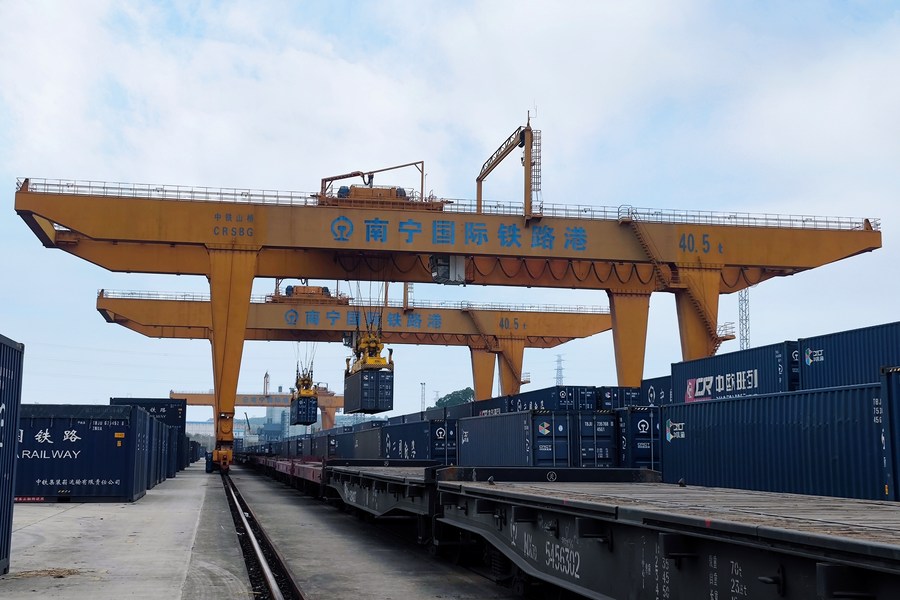RCEP helps deepen regional integration
By CHEN WEIHUA in Brussels | China Daily | Updated: 2022-01-06 10:13

Analysts see rising incomes and jobs growth for participating economies
The Regional Comprehensive Economic Partnership, which took effect on Saturday, will help expand and deepen regional economic integration, according to economists and trade experts.
The RCEP, the world's largest free trade agreement covering 15 economies, accounts for nearly a third of the world's population and 30 percent of its gross domestic product. So far, the pact has been ratified by six members of the Association of Southeast Asian Nations-Singapore, Brunei, Vietnam, Laos, Cambodia and Thailand-and China, Japan, the Republic of Korea, Australia and New Zealand.
Indonesia said on Friday that endorsement of the RCEP will be brought to a wider parliamentary vote in the first quarter of this year, before President Joko Widodo adds his signature to it.
A recent Asian Development Bank study suggests that the agreement will deliver global income gains almost double that of the Comprehensive and Progressive Agreement on Trans-Pacific Partnership, or CPTPP, a free-trade pact covering 11 Asia-Pacific economies that took effect at the end of 2018.
"RCEP effects on the region's trade will also significantly deepen regional production networks and raise productivity," said Bert Hofman, director of the East Asian Institute and professor in practice at the Lee Kuan Yew School of National University of Singapore.
Hofman cited studies that show that by 2030, the RCEP will increase members' incomes by 0.6 percent, adding $245 billion annually to regional income and 2.8 million jobs to regional employment, compared with the global income gains of $147 billion a year from the CPTPP.
He said that Japan and the ROK would in particular benefit from the RCEP and add more than 1 percent of GDP because they didn't have an FTA between them, adding that China is projected to gain about 1 percent of GDP.
"The RCEP can further grow and deepen and membership could further expand," he said, adding that if India later chooses to join, it would add significant benefits for all members. India opted out of the negotiations in November 2019.
Standard for 21st century
"Over time, the RCEP agreement could further deepen in regards to environment, labor, state support and data exchange so as to increase the quality of the agreement and make it a standard for the 21st century," said Hofman, who served as country director for China at the World Bank from 2014 to 2019.
Hosuk Lee-Makiyama, director of the Brussels-based European Center for International Political Economy, said that the European Union, the United States and India "have consistently undervalued ASEAN and failed to recognize its strategic and commercial importance for stability of the region", adding that "some have failed to engage with ASEAN on its own terms".
He said the RCEP secures the current level of openness in two of the most dynamic markets in the world-ASEAN and China.
"Some observers have chided the RCEP for its lack of new market liberalization", but they fail to understand the effectiveness of a common set of rules in integrating supply chains, he said.
Lee-Makiyama pointed out that those critics seem especially tone-deaf considering that the EU, India and the US lack political capital to engage in any trade negotiations.
The administration of US President Joe Biden has not talked about any new trade deals since taking office last January due to the strong opposition at home.
"The RCEP delivers the first-ever market liberalization for Japan with either China and ROK, showing that even the most politically or historically controversial liberalization can be ratified when they are well-packaged as a subset of a regional deal," Lee-Makiyama said.
He said that the RCEP demonstrates the value of further integration, and noted that some members may be preparing to make deeper commitments in this area with the CPTPP.
China and the ROK have applied to join the CPTPP, while six of the 15 RCEP members-Japan, Australia, New Zealand, Vietnam, Singapore and Brunei-are already in the CPTPP.
Wendy Cutler, vice-president of US-based Asia Society Policy Institute, on Friday pointed to the progress made with the RCEP now in force and the CPTPP entering its fourth year with four economies seeking membership and additional candidates on the horizon.
"With each passing year, it will get harder for the US to break into this economic integration," Cutler, a former acting deputy US trade representative, said on Twitter.
























